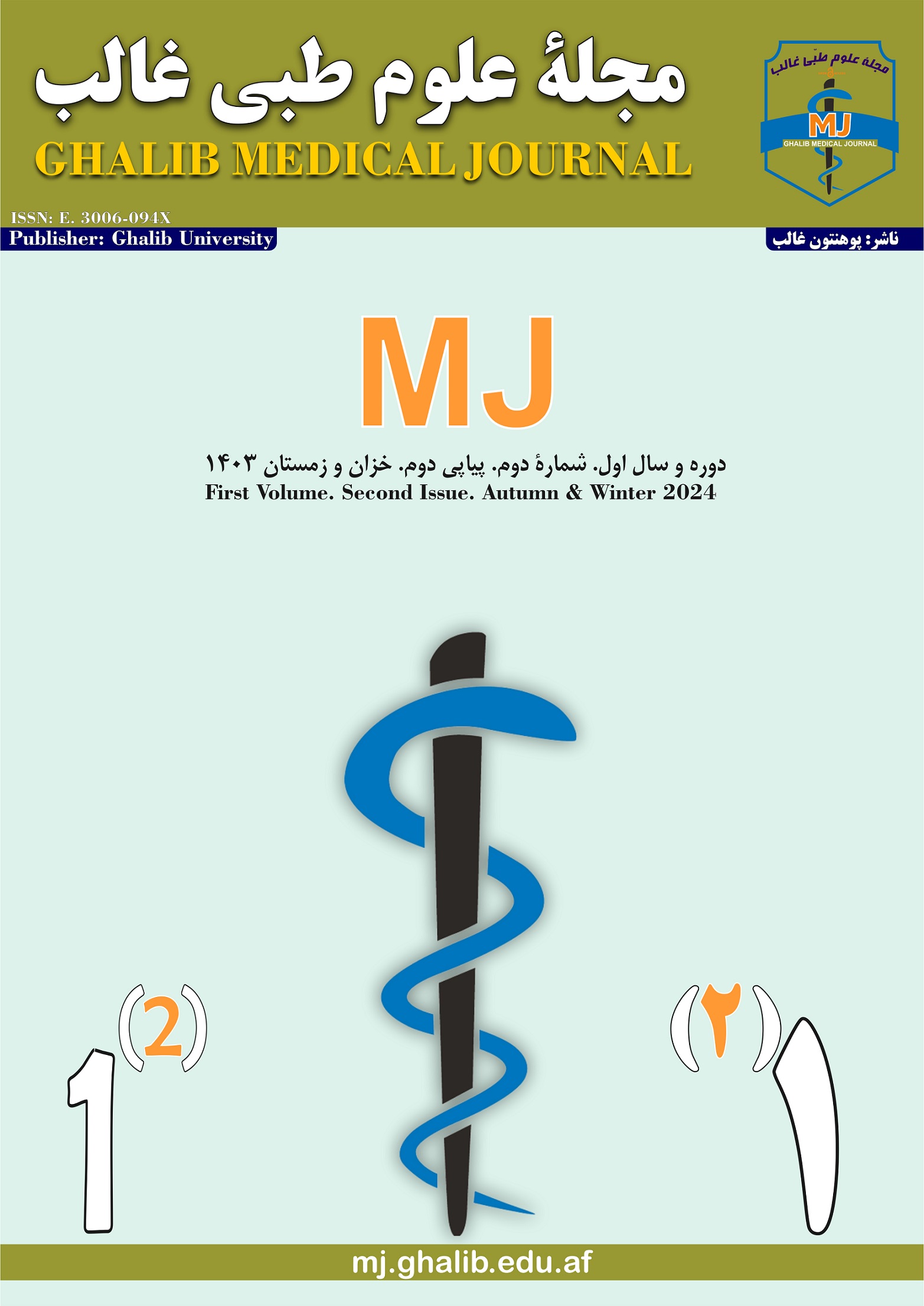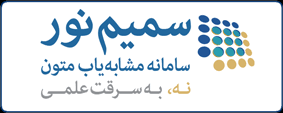افراط در استفاده شبکههای اجتماعی و پیامدهای منفی آن بالای دانشجویان و جوانان
DOI::
https://doi.org/10.58342/ghalibMj.V.1.I.2.5کلمات کلیدی:
شبکههای اجتماعی, تأثیرات منفی, نسل جوان, دانشجویان, سلامت روان, اخلاق اجتماعی, تعاملات خانوادگیچکیده
زمینه و هدف: زمینه و هدف شبکههای اجتماعی، بهعنوان یکی از مهمترین دستاوردهای فناوری اطلاعات، تحولات عظیمی را در زندگی انسانها به ارمغان آوردهاند. این شبکهها با فراهم آوردن ارتباطات گسترده و سریع، تعاملات انسانی را به سطح جدیدی رساندهاند و بر حوزههای مختلفی چون اقتصاد، فرهنگ، سیاست و علم تأثیرات عمیقی گذاشتهاند.
روش بررسی: با این حال، این پژوهش به بررسی تأثیرات منفی شبکههای اجتماعی بر نسل جوان، بهویژه دانشجویان، پرداخته است. در این مقاله، جنبههای مختلف تأثیرات منفی شبکههای اجتماعی بر حوزههای فردی، خانوادگی، اجتماعی، تحصیلی، اخلاقی و روانی مورد تحلیل قرار گرفته است. این مطالعه به صورت کمی و با استفاده از روش پیمایشی انجام شده است. برای جمعآوری دادهها، پرسشنامهای جامع شامل 37 سؤال در پنج حوزه فردی، خانوادگی، اجتماعی، تحصیلی، اخلاقی و روانی طراحی و میان بیش از 120 دانشجو توزیع گردید. و به منظور اطمینان از نمونهگیری صحیح، از روش (نمونهگیری تصادفی ساده) استفاده شد تا تمامی اعضای جامعه آماری شانس برابر برای شرکت در تحقیق داشته باشند.
یافتهها: نتایج پژوهش نشان میدهد که استفاده نادرست و افراطی از شبکههای اجتماعی میتواند منجر به مشکلات جدی در این حوزهها شود. از جمله مهمترین این تأثیرات میتوان به افزایش اضطراب و افسردگی، کاهش تمرکز، تضعیف روابط خانوادگی و اجتماعی، ترویج اطلاعات نادرست و کاهش ارزشهای اخلاقی اشاره کرد.
نتیجهگیری: این مقاله همچنین به اهمیت شناخت و مدیریت صحیح استفاده از شبکههای اجتماعی در جهت کاهش این تأثیرات منفی و حفظ سلامت روانی و اجتماعی نسل جوان تأکید دارد.
مراجع
Castells M. The Rise of the Network Society. Wiley-Blackwell; 1996.
Boyd D. It’s Complicated: The Social Lives of Networked Teens. Yale University Press; 2014.
Gallo C, Atwood JD. The Effects of the Internet on Social Relationships. J Fam Consum Sci. 2011.
Scheinbaum AC. The Dark Side of Social Media: A Consumer Psychology Perspective. Routledge; 2018.
U.S. Department of Health and Human Services, Office of the Surgeon General. Social Media and Mental Health: Impacts on Adolescents. 2019.
Deers A. The Role of Youth in National Development. 2013.
Khalaf R, Zaki M, Alexandrov D. Smartphone Use and Mental Health among University Students: A Literature Review. J Educ Comput Res. 2023.
Twenge JM. iGen: Why Today’s Super-Connected Kids Are Growing Up Less Rebellious, More Tolerant, Less Happy—and Completely Unprepared for Adulthood. Atria Books; 2017.
Hunt MG, Marx R, Lipson C, Young J. No More FOMO: Limiting Social Media Decreases Loneliness and Depression. J Soc Clin Psychol. 2018.
Aral S, Roy D, Vosoughi S. The Spread of True and False News Online. Science. 2018;359(6380):1146-51.
McClure PK. Faith and Facebook in a pluralistic age: The effects of social networking sites on the religious beliefs of emerging adults. Sociological Perspectives. 2016 Dec;59(4):818-34.
Magu S. Reconceptualizing cultural globalization: Connecting the “cultural global” and the “cultural local”. Social Sciences. 2015 Aug 19;4(3):630-45.
Atwood J, Gallo C. The effects of the internet on social relationships: Therapeutic Considerations, iUniverse. Bloomington, IN. 2011.
Woodward GC. Reclaiming Conversation: The Power of Talk in the Digital Age by Sherry Turkle: New York, NY: Penguin Random House, 2015, 436 Pp., IBSN No. 978-1-59420-555-2 (Hardback).
Valkenburg PM, Peter J. Social consequences of the Internet for adolescents: A decade of research. Current directions in psychological science. 2009 Feb;18(1):1-5.
20. Ronnenburger T, Citron DK. Pornography and Society: The New Challenge of Online Content. J Law Soc. 2009.
11. Dilling H, Mombour W, Schmidt MH. Depression in Adolescence: Diagnostic Challenges and Treatment Modalities. J Child Psychol Psychiatry. 2011.
13. Mathers CD, Loncar D. Projections of Global Mortality and Burden of Disease from 2002 to 2030. PLOS Med. 2006;3(11):e442.
Bevan JL, Gomez R, Sparks L. Social Media Use and Perceived Stress: A Longitudinal Study. J Soc Behav Personal. 2014.
Levenson JC, Shensa A, Sidani JE, Colditz JB, Primack BA. The association between social media use and sleep disturbance among young adults. Preventive medicine. 2016 Apr 1;85:36-41.
Cain N, Gradisar M. Electronic media use and sleep in school-aged children and adolescents: A review. Sleep medicine. 2010 Sep 1;11(8):735-42.
Carr N. The Shallows: What the Internet Is Doing to Our Brains. W.W. Norton & Company; 2010.
Krasnova H, Wenninger H, Widjaja T, Buxmann P. Envy on Facebook: A Hidden Threat to Users' Life Satisfaction? Proceedings of the 11th International Conference on Wirtschaftsinformatik. 2013:92-102.
Smith-Frigerio S. Grassroots mental health groups’ use of advocacy strategies in social media messaging. Qualitative Health Research. 2020 Dec;30(14):2205-16.
Jones MJ, Harvey M. Library 2.0: The effectiveness of social media as a marketing tool for libraries in educational institutions. Journal of Librarianship and Information Science. 2019 Mar;51(1):3-19.
James J, Anderson M, Gatti F. The impact of social media on family systems: Mediating role of parental perceptions. Int J Environ Res Public Health. 2019;16(24):5006. Available from: https://doi.org/10.3390/ijerph16245006
Anderson M, Vogels EA, Perrin A. Social Media Use in 2021. Pew Research Center. 2021. Available from: https://www.pewresearch.org/internet/2021/04/07/social-media-use-in-2021/
Benton A, Coppersmith G, Dredze M. Ethical Research Protocols for Social Media Health Research. In: Hovy D, Spruit S, Mitchell M, Bender EM, Strube M, Wallach H, editors. Proceedings of the First ACL Workshop on Ethics in Natural Language Processing. Valencia, Spain: Association for Computational Linguistics; 2017. p. 94-102. DOI: 10.18653/v1/W17-1612.
Hunt MG, Marx R, Lipson C, Young J. No More FOMO: Limiting Social Media Decreases Loneliness and Depression. J Soc Clin Psychol. 2018;37(10):751-768. DOI: 10.1521/jscp.2018.37.10.751.











